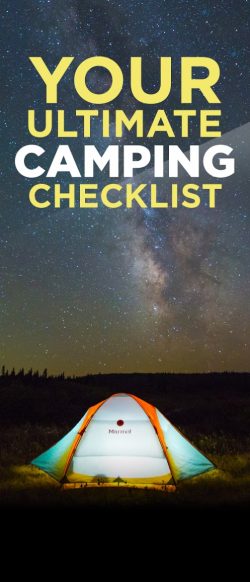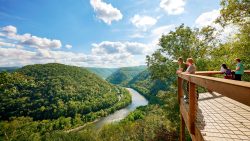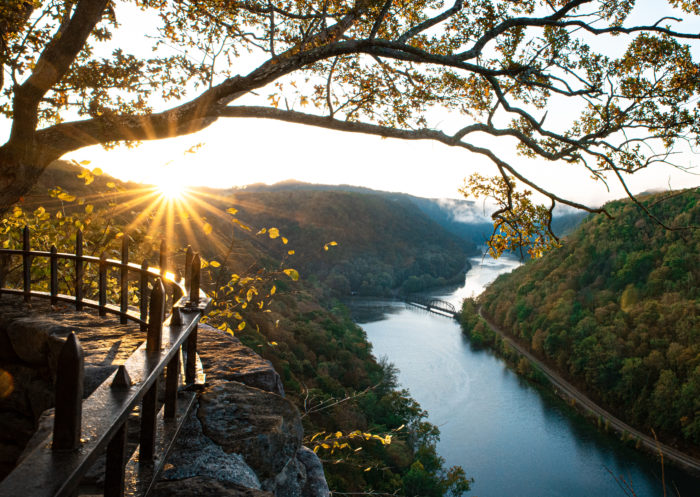Your ultimate camping checklist (and where in WV to find what you need)
There’s nothing like camping in the mountains.
This simple gear checklist well help you gather all the basics you’ll need to get started on a mountain camping trip— and point you to some some great places to gear up beforehand (or on the go!)
Types of camping
Before we get into the details of what you’ll need, though, it’s a good idea to think about what type of camping you’ll be doing, since it will determine what type of gear you’ll need.

West Virginia has all types of terrain for camping. You can park your trailer or pitch your tent at a developed, paved campground that has electrical hookups and showers. You can drive your truck back on a country road up to a rustic campsite. You can even throw all your gear into a backpack, bike pannier or touring kayak and take yourself away from all roads and automobiles. The choice is yours!
For the most part, the more you plan on “car camping” along roads and near your vehicle, the more likely you’ll be able to get your equipment at economically-priced department or sporting goods stores
The more you plan on being in the backcountry, the more specific, performance-oriented and high quality you’ll want your gear to be. You’ll be able to find the best equipment at a specific outdoor gear shop
The checklist
1. Tarp
Ok, if you’re a West Virginia native, you’ll know that it can rain here— a lot! A simple tarp can be a real game-changer.
If you are backpacking and plan on sleeping under the stars, keep one on hand in case of an unexpected cloudburst. Even if you are tent camping, a well-placed tarp can add some extra rain resistance over your tent, and make cleanup the next morning much easier.
2. Tent
Unless you’ve got a trailer or an RV, a good tent really is the foundation of your camping experience. Tents are a good idea in Appalachia especially, because even when it doesn’t rain, morning dew can soak your sleeping bag.
If you’re car camping and on a budget, any family-style tent from the sporting goods section will be great, especially if you suspend a tarp above it.
If you’re backpacking or looking for something a bit nicer, you’ll have 2 choices: a “4-season” tent will be cozy in the cold weather, but bulkier to carry and more stuffy and damp inside, since you may sweat. A “3-season” tent is lighter, cheaper and has better airflow, but will be chilly during those winter months.
3. Sleeping bags
There’s nothing more comfortable than curling up inside a dry sleeping bag during a chilly night.
If you’re going to be car camping and not concerned with weight, a quilted, square-shaped bag will be fine. If you want something a bit higher-performance, most people prefer “mummy bags,” which fit your body more snugly and even have head-fitting hoods.
Whatever style you get, think about the material. Down-filled sleeping bags are lighter and warmer, but are usually more expensive and lose their warmth if they get wet. Synthetic-filled sleeping bags are cheaper, but nowhere near as lightly packable.
4. Long underwear
Whether you’re camping in a campground or in the backcountry, a good set of long underwear tops and bottoms is essential.
Stay away from any long underwear that has cotton, which is guaranteed to make you cold and clammy as you sweat into it. Instead, invest in good merino wool or “polypro” materials, which will “wick” moisture away from your body, keeping you warm and dry at night.
5. Rain gear
You can go cheaper with rain gear, buying simple plastic ponchos that will definitely keep you dry as you move around camp during the rain.
But, if you plan on doing any kind of hiking or active movement in the rain, your body moisture will get trapped under the plastic, getting you just as wet underneath as you are on the outside! It’s best to invest in some sort of waterproof/breathable rain jacket/pants combo, made of material like Gore-tex.
6. Footwear
Camping will keep you on your feet a lot, so it’s important to have durable, comfortable shoes.
You’ve got literally hundreds of options for shoes:
- Traditional, heavy high-top hiking boots are durable and great at keeping mud and even a bit of water out, but can get very heavy for long hikes.
- Low-top trail running shoes have the comfort of sneakers but the traction of hiking boots making them a favorite for backcountry hikers.
- After your day’s adventures, don’t forget that changing into a pair of flipflops or crocs can be a much-needed comfort back at camp!
7. Stove
If you’re car camping, a 2-burner propane stove is a great option for cooking. If you want to really go all-out, check out some of the luxury models, which are fueled by refillable propane cylinders.
If you’re backpacking, you’ll have the option of either liquid or cartridge-fueled stoves. Liquid fuel stoves will last longer, while gas cartridges are more convenient and quicker to set up.
8. Food storage
Buy a cooler to keep perishables in; a good one can keep dairy, veggies and even meats fresh for several days. Instead of cube ice, freeze a gallon jug of water; it will usually last longer and be less messy.
You may need to “bear-proof” your campsite by hanging your food in a durable bag from a high branch or a rope. Even if you are car camping, it is always a good idea to put food boxes and coolers back in your car at night; raccoons, possums and bears love prowling through campgrounds for free meals!
9. Lighting
A flashlight is a no-brainer when it comes to camping. But if you really want convenience and bright illumination in your campsite, consider a good LED headlamp. The hands-free operation frees you up to do everything from set up your tent to curl up with a book without even thinking about where your light is coming from.
These days, they are even making headlamps that are rechargeable by USB!
Miscellaneous
There are dozens of other assorted gadgets and tools that every camper likes to have on hand for their adventures. You’ll ultimately have to figure out your system on your own, but here are some nice little things to think of bringing in addition to the essentials above:
- wet wipes
- pocketknife
- solar shower
- spork utensil
- nylon cord
- plastic baggies
- a hammock
Where to get your gear:
If you want the best gear and great selection, check out some of these shops in West Virginia:
- Serenity Now Outfitters (Lewisburg)
- Waterstone Outdoors (Fayetteville)
- ACE Gear Shop (Fayetteville)
- Cabela’s (Charleston and Triadelphia)
- Pathfinder (Morgantown)
This post was last updated on July 24, 2020








